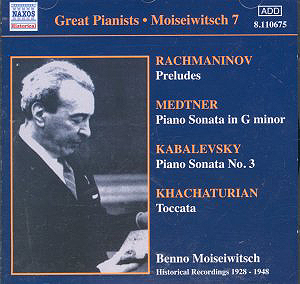Benno
Moiseiwitsch (1890-1963) was born in Odessa with its reputation
for elite pianism. The ambience could hardly have been better
for nurturing a sympathy with the Russian repertoire or at least
that part of it that straddles the Imperial late-romantic (Rachmaninov
and Medtner) and Soviet new realism (Kabalevsky).
I
have reviewed previously from this series only the Naxos that
included the Tchaikovsky first two piano concertos. It was the
repertoire that drew me to this issue.
Moiseiwitsch
was a friend of Medtner; one of a select group including Dobrowen,
Wood and Legge who formed a Medtner circle. Moiseiwitsch is not
a purveyor of gaud and glitter. From that point of view his authentic
deeply sincere approach was a near perfect match for the composer's
concern with the innate beauty of the music, its pathos and poetry
rather than surface dramatics.
The
producer is the redoubtable, indefatigable (and other warships)
Ward Marston. Seriously though ... this disc is extremely well
documented with full discographical details taken from Brian Crimp's
Moiseiwitsch HMV discography and a helpful and personable note
from Jonathan Summers.
The
recordings were made over a twenty year period from ages 38 to
58 largely at Studio C, Abbey Road. Only the Prokofiev and the
Medtner Ballade Op. 34 No. 2 were made at the Queen's Small
Hall, Studio C. The Kabalevsky and Khachaturian were made during
that period just short of a decade from 1942 when in both the
U.S.A. and U.K. when the U.S.S.R. was a valued ally.
The
Rachmaninov B minor prelude was a particular favourite
of the composer and of Moiseiwitsch. Here is it presented in two
alternative versions the second of which is preferable because
ot its greater clarity - the first version recorded only two months
before is more mistily suggestive. The Moment Musical is
turbulently romantic and like all the pieces here is ample evidence
for Moiseiwtsch's phenomenal touch encompassing whispering quiet
and thunderous storms. Lilacs is impressive for
its gently coruscating roulades of notes.
Moiseiwitsch
neatly warms up Prokofiev's Suggestion Diabolique from
gruff Mephisto morose to terse and exuberant dissonance-fest.
It
is a great shame that Moiseiwitsch did not record more Medtner.
The two men were close and the pianist's unglamorous sincerity
seems completely in keeping with the composer's understated poetry,
pathos and beauty. Of course there is some leonine galloping writing
as well; as in the Tenebroso movement of the G minor
sonata. Moiseiwitsch colours with flecks and flurries of colour
the two Ballades. He is joined by the composer for
the Round Dance which is half way between Grainger
and Stravinsky at first then finds itself in more romantic waters.
The
Kabalevsky Sonata No. 3 is pretty much in the same mould
as the second and third piano concertos though not as memorably
tuneful as those works. The Khachaturian pieces contrast rather
surprisingly. The Toccata is not the hell-for-leather
adrenaline chaser I had expected but has a slightly Iberan ediginess.
It is controlled, full of carefully contrived variety - perhaps
rather anonymous. The Levant make-over of the Sabre Dance
is all you might expect as a roller-coaster piece of escapism
but finds time for poetry as well.
Ward
Marston has I think wisely left the whiskery regular surface noise
of the 78s in place. Too much other treble information would have
been destroyed to have excised it. Clicks, crackles and other
audio damage has been elided.
Rob
Barnett

